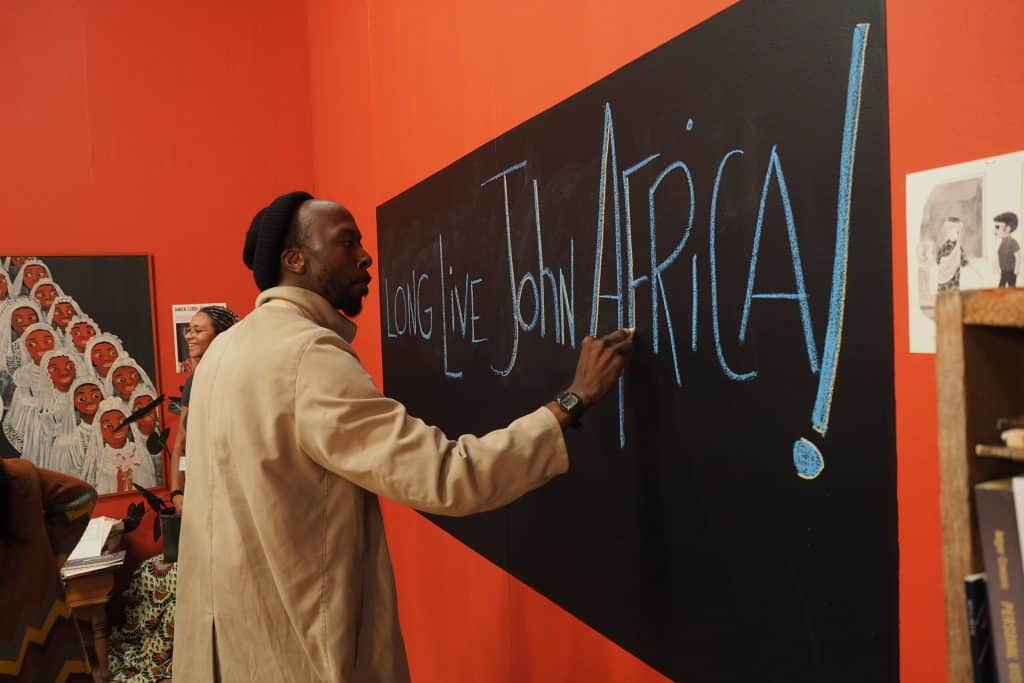Read also:
How to Watch FX Live Without CableHow To Watch AMC Without CableHow to Watch ABC Without CableHow to Watch Paramount Network Without CableEphraim Asili’s Godard-inspired treatise on Black activism and community-building loses itself a bit in its artistic flair.
In Ephraim Asili‘s The Inheritance, Julian, a young Black man played by Eric Lockley, inherits a house from his grandmother and turns it into a commune. What follows is a struggle to find consensus in a communal house that weaves documentary detail about the radical past with the present to try and find a new radical path for Black liberation. What we get is stuffed with powerful imagery that tries to get at this noble aim, but doesn’t manage to convert all those brilliant ideas into a coherent final product.
The structure here is as eclectic as its material. There is the present timeline, in which there are snapshots of interpersonal debates and communal activities with the ensemble in their formation of this ‘house of Ubuntu’, complete with mockumentary-style short monologues from each character. These are paired with documentary inserts from MOVE, the Black liberation group in Philadelphia, which was bombed by the Philadelphia Police Department in 1985 (and which Asili was a member of).
Putting past and present in conversation in this way is an interesting choice. Asili entrenches the heart of this film in Black radical history, while also blending reality and fiction. This very deliberate rejection of conventional structures seems like a way for Asili to present the film’s radicalism both in text and method. That said, I think there are times where this does more harm than good; Sometimes the film gets a little confusing, and for the first half-hour, it feels near impossible to stay grounded in what’s happening.

The collage-like nature of The Inheritance also facilitates some idiosyncratic choices from Asili. Actors fade in and out of the screen. Records with speeches of radicals like Angela Davis pop onto a table in the blink of an eye, with African drums playing in the background. We watch someone’s hands as they set up a drum kit. Not all these shots feel like they contribute to the themes at play, but the artistic flair is fantastic to watch – especially in the dramatic movement between documentary and fiction. Asili also makes use of the vibrant block colors of the house to create striking images from each of his actors, whether they’re delivering a monologue, or simply taking books out of a crate.
Where this film struggles is in translating that artistic flair into substance – especially when the focus is on the members of the House of Ubuntu. There are various interactions and conflicts between the collective, and particularly between the boisterous Rich (Chris Jarrel) and Gwen (Nozipho Mclean), a brilliant but uptight radical who is also Julian’s partner. Most of these interpersonal conflicts fall flat. Sometimes the acting is overplayed and other times it’s too timid. Part of the problem is that we never sit with them as people rather than just models for the camera, so there’s no reason to properly invest in their human drama.
Where these actors come far more into their own is when they’re put into theatrical performances, the camera holding tight to their faces as they perform powerful monologues. The standout in these scenes is easily Julien Rozzell Jr. as Old Head — while his acting is a little much for naturalistic scenes, he commands the screen with power and charisma in theatrical ones.
The Inheritance isn’t lacking in ideas; it’s deeply entrenched in a rich radical Black history and wants you to know it.
Asili relentlessly hits us with powerful Black figures of past and present. The legendary Sonia Sanchez appears with a beautifully-shot reading of a poem about Harriet Tubman. There’s a section where we see Shirley Chisolm responding powerfully to questions during her candidacy for the DNC. Each of the mockumentary interviews is shot in front of a blackboard with a quote from a Black radical on it (like Kwame Nkrumah and Audre Lorde). All this also comes with the documentary video from the MOVE organization which is both inspirational and harrowing. The impact of all these figures is undeniable but Asili’s invocation of them feels a little scattershot. We touch upon the whiteness of the nuclear family, Black socialism, gendered dynamics, police brutality, and more, but never home in to say anything of note about them. They’re just mentioned, and we move on.
The Inheritance isn’t lacking in ideas; it’s deeply entrenched in a rich radical Black history and wants you to know it. There’s a lot of creativity in the filmmaking. The problem is that these ideas and histories are never brought together into something cohesive. So, there’s a whole collection of beauty and imagery and power that never quite reaches its potential.
The Inheritance gets on stage and preaches power to the people on demand March 12th.